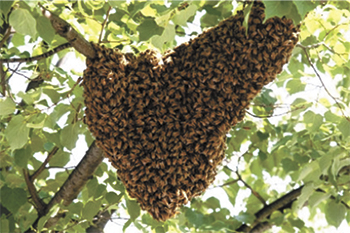| Bee Keeping News... |
|
Swarming season is just around the corner! A lot of people panic when they see the bees. They assume “swarm” means “attack” or that these are “killer bees” (we do not have the Africanized, aka “killer”, honey bees in NC). Swarms are simply nature’s way of forming new colonies. It happens with wild honey bee colonies and can happen with maintained honey bee colonies.
Things work a little different with bees compared to humans. Unlike when your parents encouraged you to leave (or simply waited for you to go away to school and then they changed all of the locks), the current queen bee is the one who leaves with about half or more of the hive occupants. They land on a tree or another vertical surface (preferably) and hang out while some scout bees going real estate hunting. Obviously, it’s not easy to find the ideal home for tens-of-thousands of bees. They want an area protected from the weather and (hopefully) predators and a good neighborhood with plenty of food resources (flowering plants). It can take hours or even days for them to find the ideal spot. Meanwhile, you find this massive glob of bees clinging to a branch or other surfaces, which are largely in a quiescent (and therefore mostly non-defensive) state.
Understandably, people that are truly allergic to bee/wasp stings will be most concerned. These bee swarms are pretty docile because they’re not defending a nest. They’re preoccupied with finding new digs. Of course, this doesn’t mean you can start smacking at them either.
The bees typically leave in a few hours, so if people can “bee patient”, the swarm will head off to their new home. We strongly suggest avoiding spraying them with a pesticide (“green” or not) or even soapy water which will still kill them. Blasting them with water as an alternative to using chemicals may also produce fatal results if the queen is injured or killed. Even with schools and childcare facilities and other public places where there’s always a lot of genuine concern about the consequences of stings, if it’s possible to simply rope off the area and keep everyone away, it will produce positive results as a learning experience for the kids (and others) and another opportunity to protect a wild bee colony. The duration of the swarm is definitely another one of those “it depends” situations that can actually end up with the swarm staying for a day or two (weather influences their movement).
It’s definitely best to have people contact a local beekeeper to remove the swarm. If you don’t know any beekeepers, please call your local Cooperative Extension office @704-482-4365. They have a list of local beekeepers willing to capture swarms.
Mike Waldvogel and David Tarpy, NC Cooperative Extension Entomology
|
|
Printer-friendly format
|
|





